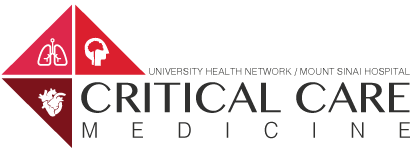Mechanical Ventilation Course 2024
April 23 - 25, 2024 / hybrid meeting
UHN BMO Education & Conference Centre, Toronto
Mechanical Ventilation course 2024
From Physiology to Clinical Practice
Presented by: The Interdepartmental Division of Critical Care Medicine, University of Toronto
3days
32speakers
25sessions
8hands-on stations
4Case Discussions
1Panel Discussion
CME Accreditation
Royal College of Physicians and Surgeons of Canada –
Section 1
This event is an Accredited Group Learning Activity (Section 1) as defined by the Maintenance of Certification Program of the Royal College of Physicians and Surgeons of Canada, and approved by Continuing Professional Development, Temerty Faculty of Medicine, University of Toronto. You may claim up to a maximum of 18.5 hours for in-person attendance and 16.0 hours for virtual attendance.
Royal College of Physicians and Surgeons of Canada –
AMA PRA Category 1 Credit™
Through an agreement between the Royal College of Physicians and Surgeons of Canada and the American Medical Association, physicians may convert Royal College MOC credits to AMA PRA Category 1 Credits™. For more information on the process to convert Royal College MOC credit to AMA credits please visit American Medical Association Ed Hub.
This activity has been approved for 15.75 CPD credits by the Canadian Society of Respiratory Therapists. Credits are calculated as 1.0 credit per hour of education.
Target Audience
All members of the ICU interprofessional team involved in the care of mechanically ventilated patients.
Interested professionals will include physicians, respiratory therapists, nurses, physiotherapists.
Experienced professionals and professionals-in-training will find this course relevant and very helpful in their clinical practice.
Goals
- Enhance ICU clinicians’ understanding of the physiological principles informing assessment and management of mechanical ventilation and strengthen their skills in assessing patient-ventilator interaction.
- Increase awareness of the many relevant aspects of conventional and novel invasive and non-invasive mechanical ventilation techniques.
- Enhance ICU clinicians’ knowledge of the management of specific clinical problems in mechanically ventilated patients: acute respiratory distress syndrome, chronic obstructive pulmonary disease exacerbations, and difficult weaning from mechanical ventilation.
What you will learn
By the end of the course, participants will be able to…
Explain and assess basic physiological aspects of patient-ventilator interaction: respiratory mechanics, respiratory muscle action, patient-ventilator synchrony, and ventilator-induced lung and respiratory muscle injury.
Determine why and when mechanical ventilation can be a treatment, a supportive therapy or a source of complications.
Describe the optimal approach to liberating patients from mechanical ventilation and conduct a comprehensive clinical assessment to and treat causes of difficult ventilator weaning.
Deliver evidence-based management of acute respiratory failure using both non-invasive and invasive ventilatory techniques for the following conditions: acute respiratory distress syndrome, chronic obstructive pulmonary disease, and weaning from mechanical ventilation.
Course Directors

Laurent Brochard MD, HDR
St. Michael’s Hospital, Unity Health Toronto

Niall Ferguson MD, MSc
University Health Network & Sinai Health System

Ewan Goligher MD, PhD
Toronto General Hospital & Sinai Health System

Irene Telias PhD, MD
St. Michael’s Hospital
Faculty Members

Catherine Bellissimo
University Health Network

Vagia Campbell MSc, (Hons) BHA, RRT
University Health Network

Lorenzo Del Sorbo MD
Toronto General Hospital

Jose Dianti MD
Interdepartmental Division of Critical Care Medicine

John Granton MD
Toronto General Hospital

Michael Long
Toronto General Hospital

Matias Madorno MD
Buenos Aires Institute of Technology

Laveena Munshi
Mt. Sinai Hospital

Vorakamol Phoophiboon MD, MSc
St. Michaels Hospital, Unity Health Toronto

Peter Reardon MD
Scarborough Health Network

Jean-Christophe Richard MD PhD
Angers University Hospital

Annia Schreiber MD
St. Michael’s Hospital, Unity Health Toronto

Jeffrey Singh MD, FRCPC
Department of Medicine, University Health Network

Michael Sklar
St. Michael's Hospital

Jenna Spring MD
Sunnybrook Health Sciences Centre

Shaurya Taran
University of Toronto
Ricardo Teijeiro Paradis MD
Interdepartmental Division of Critical Care Medicine, University of Toronto

Manuel Tisminetzky MD, MSc
Interdepartmental Division of Critical Care Medicine

Martin Urner MD
Toronto General Hospital

Fernando Vieira PT, BMET
St. Michael’s Hospital, Unity Health Toronto
Course Schedule
This event will be taking place in EST (Eastern Standard Time).
The course schedule will be posted here once available.
-
23TuesdayApr 2024
Physiological Principles
-
24WednesdayApr 2024
Modes of Ventilation
-
25ThursdayApr 2024
Diseases, Syndromes, and Clinical Recommendations (Hybrid)
- 8:30 am - 9:20 am
Equation of motion: pressures, volumes and flow
Laurent Brochard
- 9:25 am - 10:00 am
Mechanics of breathing
Ewan Goligher
- 10:05 am - 10:30 am
Determinants of respiratory drive and effort
Irene Telias
- 10:30 am - 10:45 am
Break
- 10:45 am - 11:15 am
Patient-ventilator synchrony
Laurent Brochard
- 11:20 am - 11:45 am
Heart-lung interactions
John Granton
- 11:50 am - 12:15 pm
Understanding sedation-ventilation interactions
Michael Sklar
- 12:15 pm - 1:15 pm
Lunch break
- 1:15 pm - 1:50 pm
Lung- and diaphragm-protective ventilation
Ewan Goligher
- 1:55 pm - 2:20 pm
PEEP and lung recruitment
Jose Dianti
- 2:20 pm - 2:30 pm
Break
- 2:30 pm - 2:55 pm
Prone positioning and inhaled pulmonary vasodilators
Lorenzo Del Sorbo
- 3:00 pm - 3:25 pm
Renal-protective ventilation
Sean Bagshaw
- 3:25 pm - 3:40 pm
Break
- 3:40 pm - 4:10 pm
Case discussion: managing refractory hypoxemia and ECLS
Laurent Brochard
Niall Ferguson
Ewan Goligher
Ricardo Teijeiro Paradis
- 4:15 pm - 4:45 pm
Special situations: unilateral lung injury, obesity
Laurent Brochard
- 5:00 pm - 6:00 pm
Welcome reception
- 8:30 am - 8:55 am
Conventional modes of ventilation
Niall Ferguson
- 9:30 am - 9:55 am
Proportional Modes: PAV+ and NAVA
Laurent Brochard
- 9:30 am - 10:45 am
Non-invasive strategies – HFNO, NIV, Helmet
Bruno Ferreyro
- 10:00 am - 10:25 am
Oxygen setting: does it matter?
Laveena Munshi
- 10:25 am - 10:35 am
Break (10 minutes)
- 10:35 am - 11:00 am
Mechanical ventilation during cardiac arrest
Jean-Christophe Richard
- 11:00 am - 11:25 am
How I do it: assessing readiness for liberation
Laurent Brochard
- 11:30 am - 12:00 pm
How I do it: assessing the difficult-to-liberate patient
Ewan Goligher
- 12:00 pm - 1:00 pm
Lunch (1 hour)
- 1:00 pm - 4:00 pm
Hands-on sessions
35 minutes per station, 10-minute intermission between stations
Monitoring techniques (I): Measuring mechanics and lung recruitment
Fernando Vieira
Monitoring techniques (II): Ultrasound to assess respiratory failure
Catherine Bellissimo
Annia Schreiber
Monitoring techniques (III): Monitoring patient inspiratory effort
Matias Madorno
Irene Telias
Monitoring techniques (IV): Electrical impedance tomography
Matthew Ko
Vorakamol Phoophiboon
Monitoring techniques (V): Esophageal manometry
Andrea Castellvi-Font
Jose Dianti
Interventions: Inspiratory muscle training
Ewan Goligher
Georgie Roman-Sarita
Simulated case: Diagnosing and managing patient-ventilator dyssynchrony
Laurent Brochard
Interventions: Setting up and troubleshooting non-invasive respiratory support
Michael Long
- 8:30 am - 9:20 am
Case Discussion: Evidence-based management of acute hypoxemic respiratory failure and ARDS
Niall Ferguson
Matthew Ko
Jean-Christophe Richard
Irene Telias
Martin Urner
- 9:25 am - 9:50 am
Case discussion: Protective mechanical ventilation in acute brain injury
Jeffrey Singh
Shaurya Taran
- 9:50 am - 10:05 am
Break (15 minutes)
- 10:05 am - 10:35 am
Evidence-based sedation management in ventilated patients
Angela Jerath
- 10:40 am - 10:55 am
Sleep disruption during mechanical ventilation
Irene Telias
- 11:00 am - 11:20 am
Ventilator-associated brain injury
Thiago Bassi
- 11:20 am - 11:30 am
Break (10 minutes)
- 11:30 am - 11:55 am
Case discussion: Spontaneous breathing in acute hypoxemic respiratory failure: who, when, how, and why?
Laurent Brochard
Jose Dianti
Ewan Goligher
Idunn Morris
Irene Telias
- 12:00 pm - 12:30 pm
Panel discussion: Enhancing quality of care for ventilated patients
Vagia Campbell
Peter Reardon
Georgie Roman-Sarita
Jenna Spring
Manuel Tisminetzky
- 12:30 pm - 1:00 pm
Lunch Break (30 minutes)
- 1:00 pm - 3:00 pm
Challenging Clinical Problems
- 1:00 pm - 1:20 pm
On the horizon: diaphragm neurostimulation
Idunn Morris
- 1:25 pm - 1:50 pm
Interactive case: COPD
Laurent Brochard
- 2:00 pm - 2:25 pm
Interactive case: Difficult weaning
Ewan Goligher
- 2:25 pm - 2:30 pm
Wrap up
- 2:30 pm - 3:00 pm
End of the course
Rates
Purchase access to the recordings for the 2023 Mechanical Ventilation Symposium.
If you are residing in a low- or middle-income country, you may qualify for a reduced rate. Please contact us for more information.
-
Refund / Cancellation Policy
Cancellation Policy:
- An administration fee of 10% applies to all cancellations by March 29, 2024.
- NO REFUND after March 29, 2024.
- Replacement delegates are welcome at no additional charge.
- Please provide the name change to registration@criticalcarecanada.com before event starts.
Venue
UHN BMO Education & Conference Centre
60 Leonard Ave,
Krembil Discovery Tower,
Toronto, ON M5T 0S8
The BMO Education & Conference Centre is housed on the Toronto Western Hospital Campus and it is on the first floor of the world-class research centre: the Krembil Discovery Tower.
PARKING
Parking is available at the BMO Education & Conference Centre via two lots off of Nassau Street. The first is located at the corner of Bathurst and Nassau and the second lot entrance is located on Nassau Street just east of Leonard Avenue.
The parking lots remain open, provided they are not at capacity. All standard payment methods are accepted. Parking rates are $10/hr or $45.50/day.
Streetcar
From the subway stations:
- ST. PATRICK: Take 505 and get off at Bathurst Street (about 12 minutes)
- QUEEN’S PARK STATION: Take 506 and get off at Bathurst Street (about 12 minutes)
UHN SHUTTLE
There is a free UHN shuttle service that runs between Toronto Western Hospital and Toronto General Hospital. The shuttle is convenient and easy to use. As Toronto General Hospital is on the Subway line (QUEEN’S PARK STATION), it makes it very easy to access the shuttle and arrive at Toronto Western Hospital (the shuttle is NOT wheelchair accessible).
The shuttle leaves Toronto General Hospital (University Avenue entrance) starting at 6:15am in the morning and runs until 8:15pm. Upon arrival at Toronto Western Hospital, walk north on Leonard Avenue to access the main entrance to the Krembil Discovery Tower where the BMO Education & Conference Centre is located.
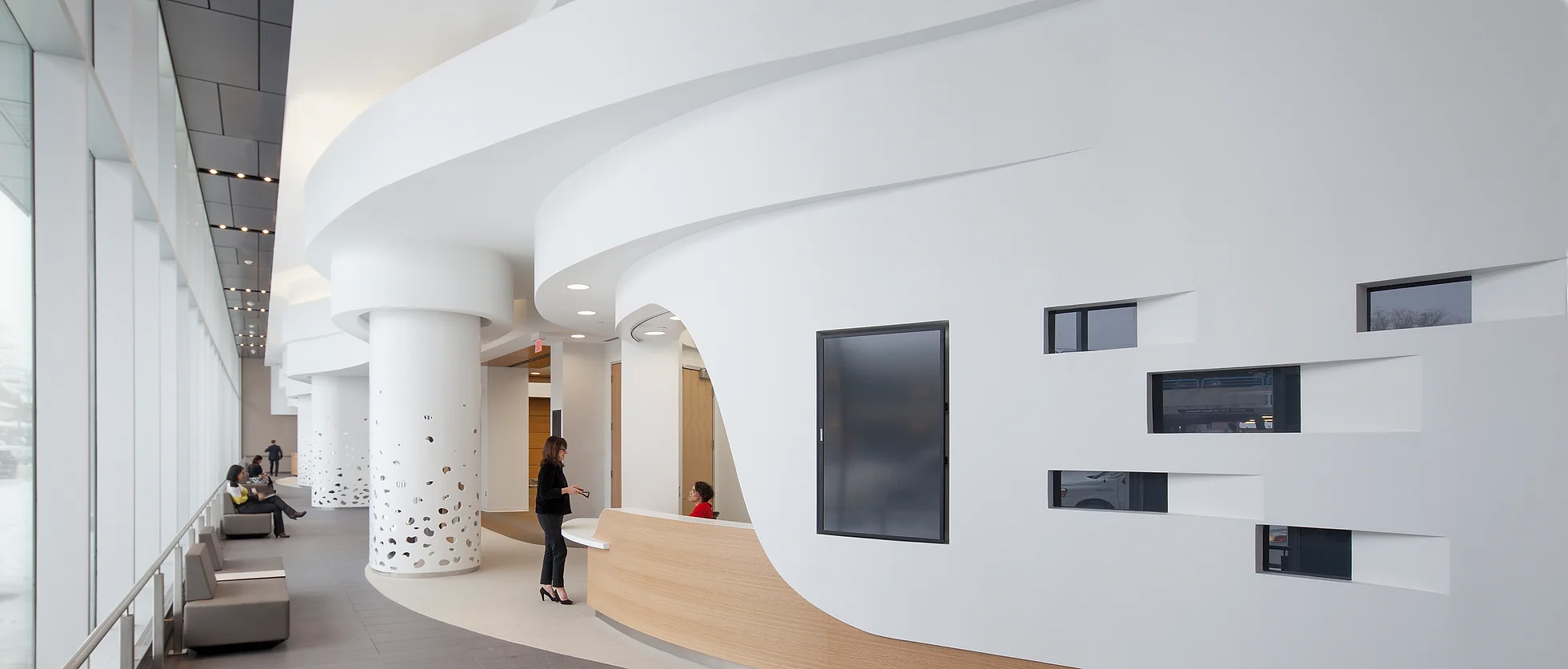
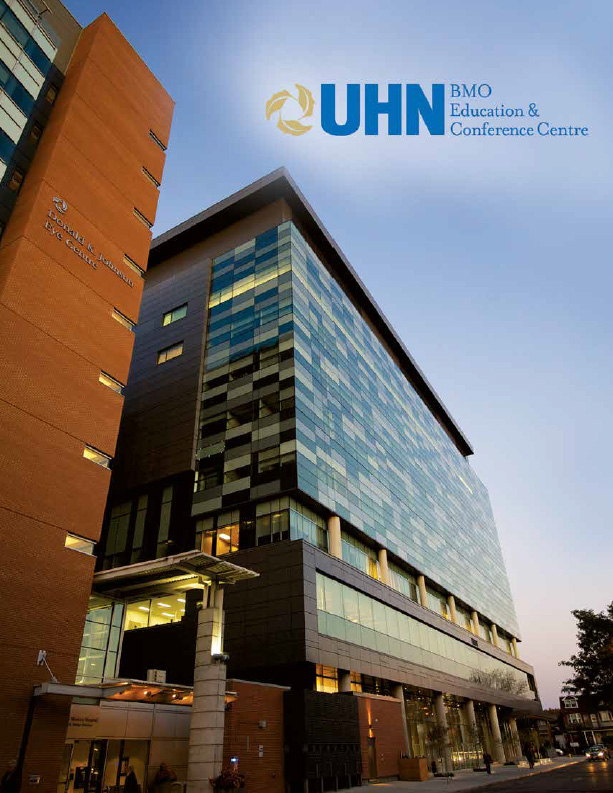
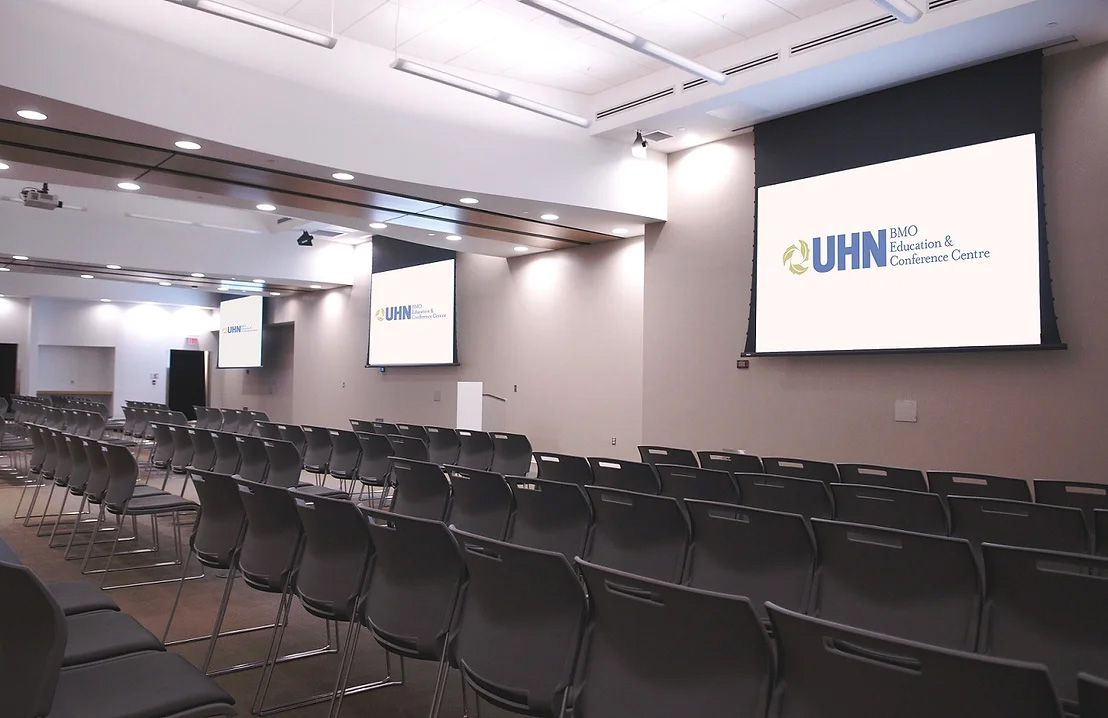
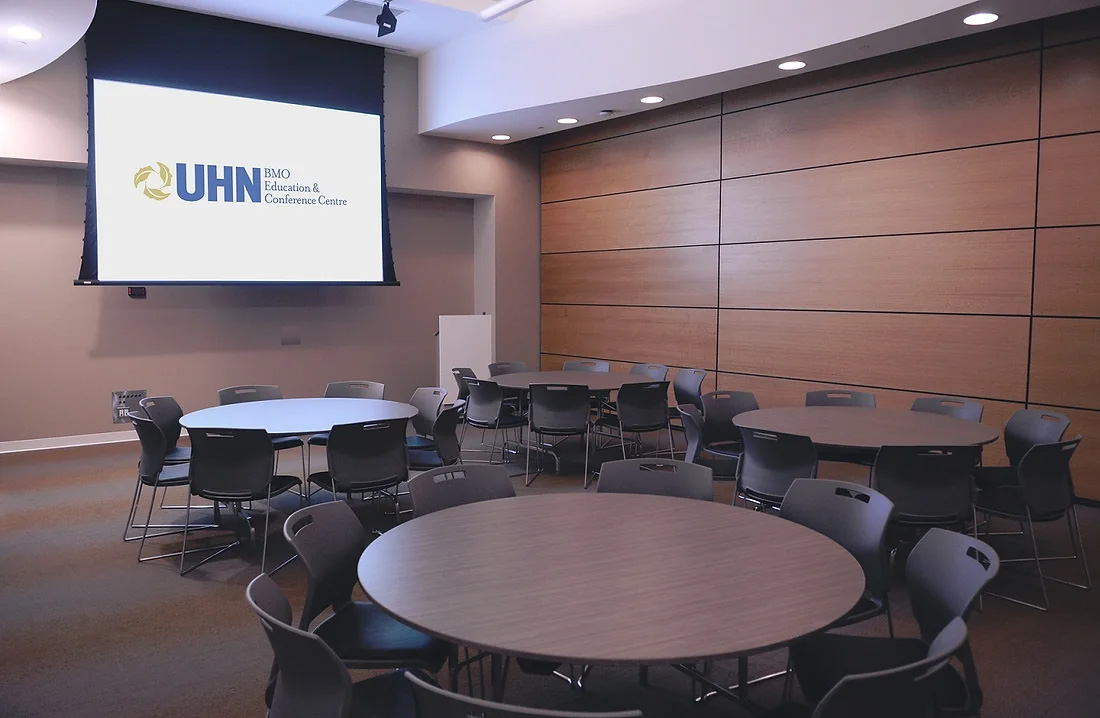
Contact Us
We'd love to help.

